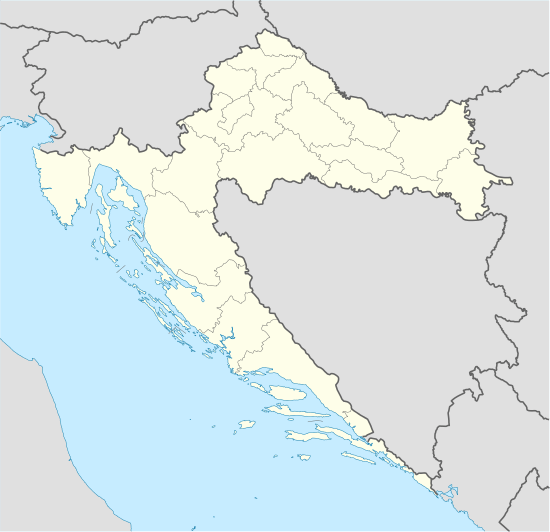Novska
| Novska | |
|---|---|
| Town | |
|
Novska railway station | |
 Novska Location of Novska in Croatia | |
| Coordinates: HR 45°20′N 16°59′E / 45.333°N 16.983°E | |
| Country |
|
| County |
|
| Government | |
| • Mayor | Vlado Klasan (HSLS) |
| Population (2011)[1] | |
| • Total | 13,518 (municipality) |
| Time zone | Central European Time (UTC+1) |
Novska is a town in the Sisak-Moslavina County of Croatia. It is located in western part of the historic region of Slavonia, between Kutina and Nova Gradiška, 94 km (58 mi) linear distance southeast of the capital, Zagreb.[2]
Demographics
Novska has a total population of 13,518 in the following settlements:[1]
- Bair, population 6
- Borovac, population 273
- Brestača, population 913
- Brezovac, population 9
- Bročice, population 964
- Jazavica, population 398
- Kozarice, population 433
- Kričke, population 23
- Lovska, population 9
- Nova Subocka, population 713
- Novi Grabovac, population 14
- Novska, population 7,028
- Paklenica, population 279
- Plesmo, population 87
- Popovac, population 10
- Rađenovci, population 2
- Rajčići, population 4
- Rajić, population 875
- Roždanik, population 262
- Sigetac, population 122
- Stara Subocka, population 502
- Stari Grabovac, population 393; the site of an Ustase concentration camp[3]
- Voćarica, population 199
In the 2011 census, 91.64% (12,388) of the population were Croats and 4.74% (641) were Serbs.[4] In 1991 in the town lived 24,696 inhabitants, Croats 16,556 (67,03%), Serbs 5,402 (21.87%), Yugoslavs 675 (2.73%), others 2,063 (8.35%).
History
Before 1881, Novska was part of the Austrian monarchy (Kingdom of Croatia-Slavonia after the compromise of 1867), in the Slavonian Military Frontier, Gradiskaner Regiment N°VIII.[5] Between 1881 and 1918, in the Požega County of the Kingdom. Stari Grabovac was site of a Nazi concentration camp during World War II.[3]
According to the website of the Civic Committee for Human Rights–Centre for Dealing with the Past Centre for Peace, Nonviolence and Human Rights-Osijek (MONITORING WAR CRIME TRIALS REPORT FOR JANUARY AND FEBRUARY 2012), Željko Belina, Dejan Milić, Ivan Grgić, and Zdravko Plesec, former members of the Croatian Army, were charged with committing war crimes during the Yugoslav wars against local Novska Serb civilians, i.e. torturing and killing Vera Mileusnić and her daughter Goranka, and a neighbour, Blazenka Slabak, in December 1991. Petar Mileusnić, Vera's husband and Goranka's father, was shot, but survived his injuries. Ultimately the charges were vacated and the defendants initially exonerated by the Croatian judiciary under that country's Amnesty law.[6]
However, the Zagreb County Court's War Crimes Council found Belina and Milić guilty on 8 March 2013. Belina was sentenced to 10 years, and Milić to 9 years in prison. Grgić, and Plesec were not re-charged and apparently exonerated.[7]
Transport and industry
The Croatian railway lines M103, M104 and M105 are connected with each other at Novska railway station. All of them and the A3 motorway, which runs passes by south of the town, are part of Pan-European Corridor X. Novska is known for its steel elbow factory, Metaflex.
References
- 1 2 "Population by Age and Sex, by Settlements, 2011 Census: Novska". Census of Population, Households and Dwellings 2011. Zagreb: Croatian Bureau of Statistics. December 2012.
- ↑ www.luftlinie.org
- 1 2 Based on commons map "Fascist_concentration_camps_in_yugoslavia.png".
- ↑ "Population by Ethnicity, by Towns/Municipalities, 2011 Census: County of Sisak-Moslavina". Census of Population, Households and Dwellings 2011. Zagreb: Croatian Bureau of Statistics. December 2012.
- ↑ Map of the Corinphila-Auktionen 2003.
- ↑ "The VSRH's Appeals Chamber held its session on 21 February 2012. It concerns one of the crimes in respect of which the Amnesty Act was unfoundedly [sic] applied. Namely, the trial was conducted in 1992 ... the committed offence was qualified as a murder. After the investigation, the Military Prosecution in Zagreb dropped charges against Grgić and Plesec, whereas the Military Court in Zagreb continued the trial against Belina and Milić (as well as against presently deceased Dubravko Leskovar). However, on 2 November 1992, this trial was concluded by issuance of the decision on dismissal of the criminal procedure by applying the Amnesty Act. Later on, injured parties filed a criminal report ... for the same event but this time commission of a war crime against civilians under Article 120, paragraph 1 of the OKZRH."
"In July 2010, the Sisak ŽDO laid the indictment. However, after the main hearing, on 19 November 2010, the Sisak County Court's War Crimes Council rendered a judgement rejecting the charge pursuant to Article 353, item 5 of the Criminal Procedure Act because it was of the opinion that this was a res iudicata case i.e. that the matter was already judged and that the defendant cannot be tried again. Detention against defendants was vacated and they were released." - ↑ Retrial for 1991 war crime, balkaninsight.com; accessed 18 September 2016.
External links
| Wikimedia Commons has media related to Novska. |
